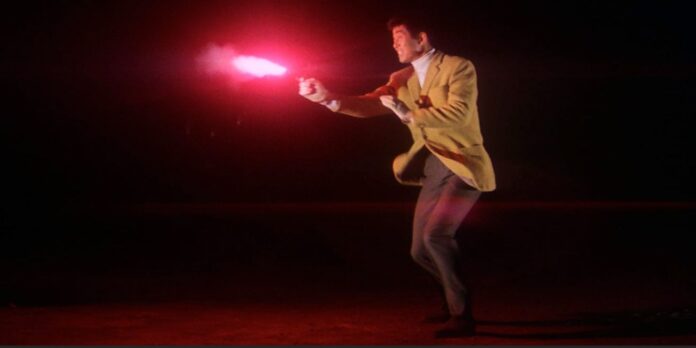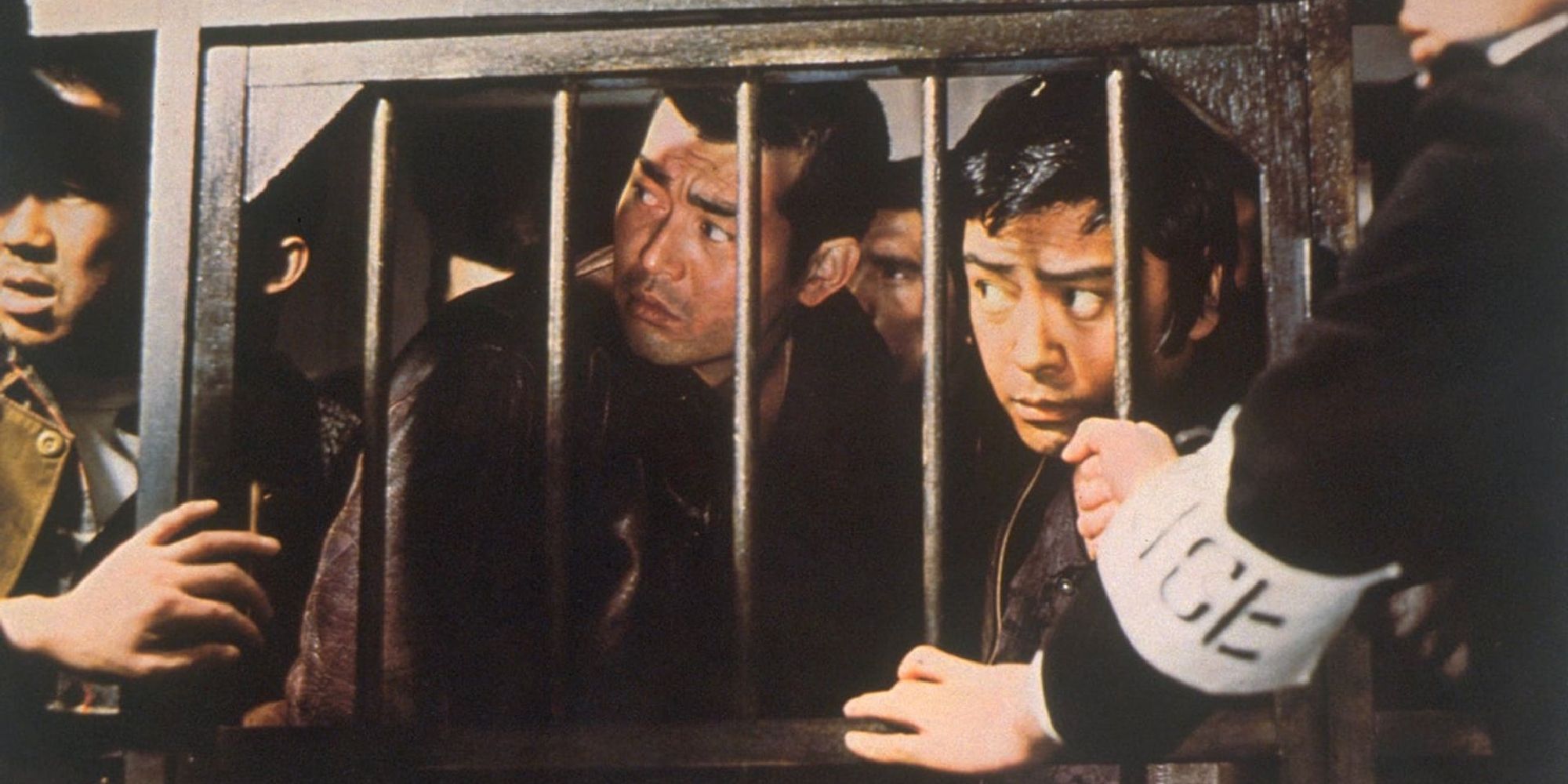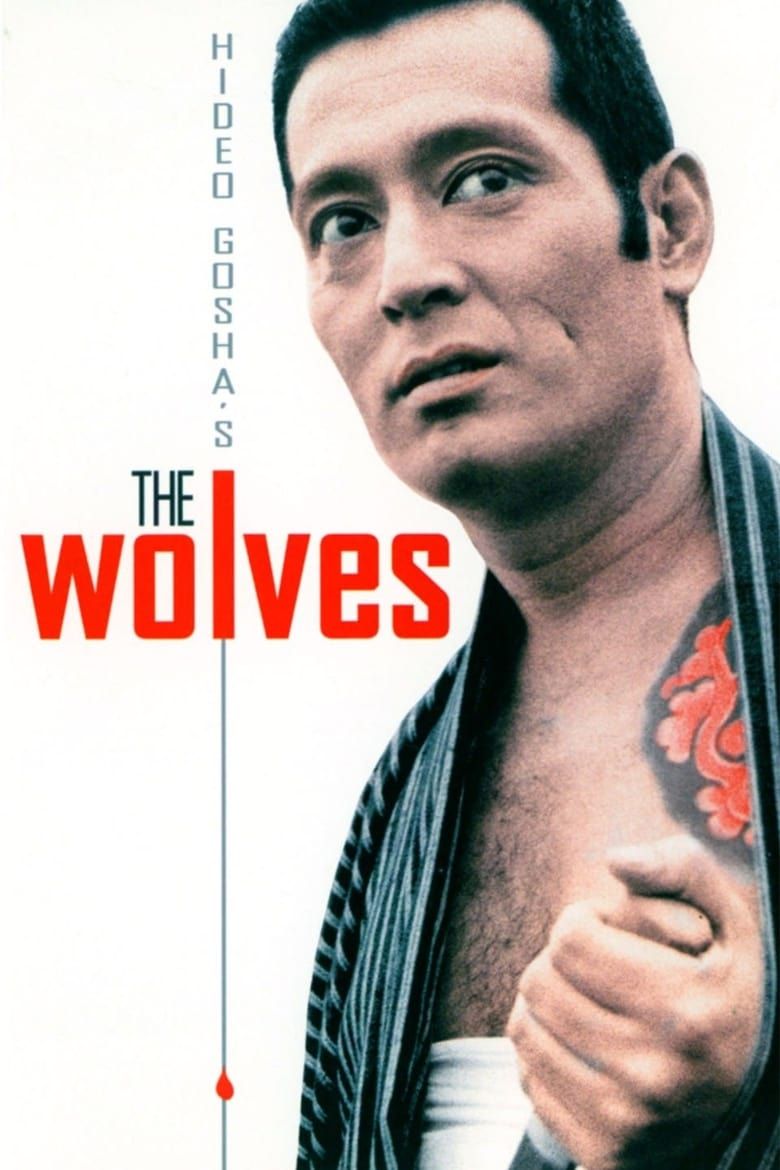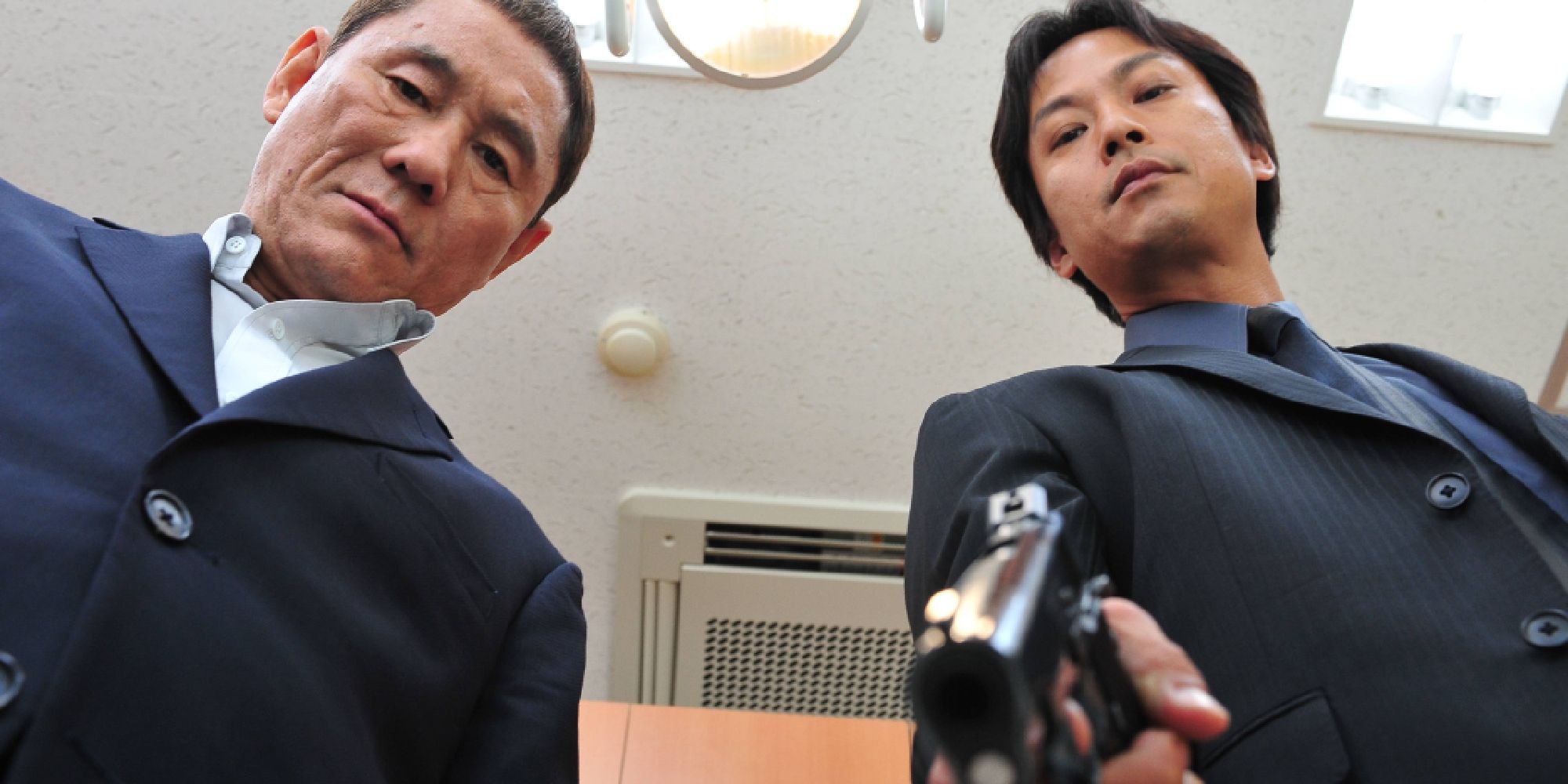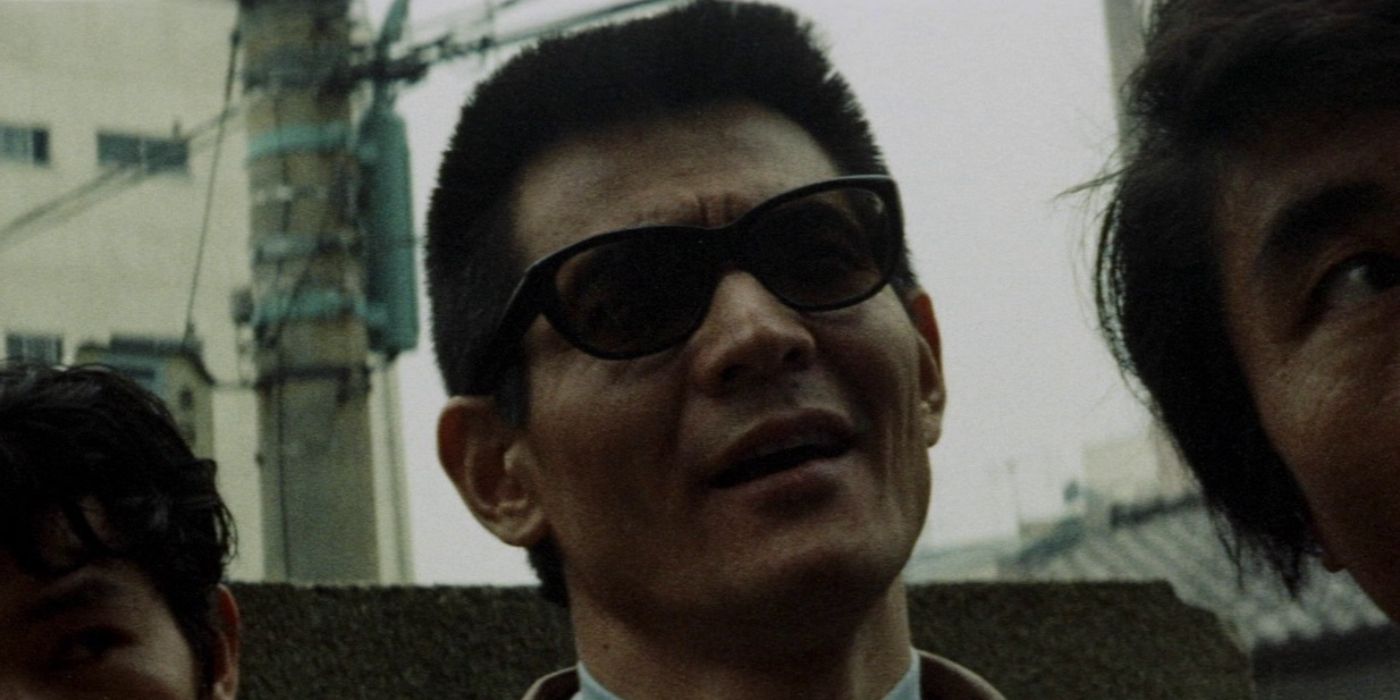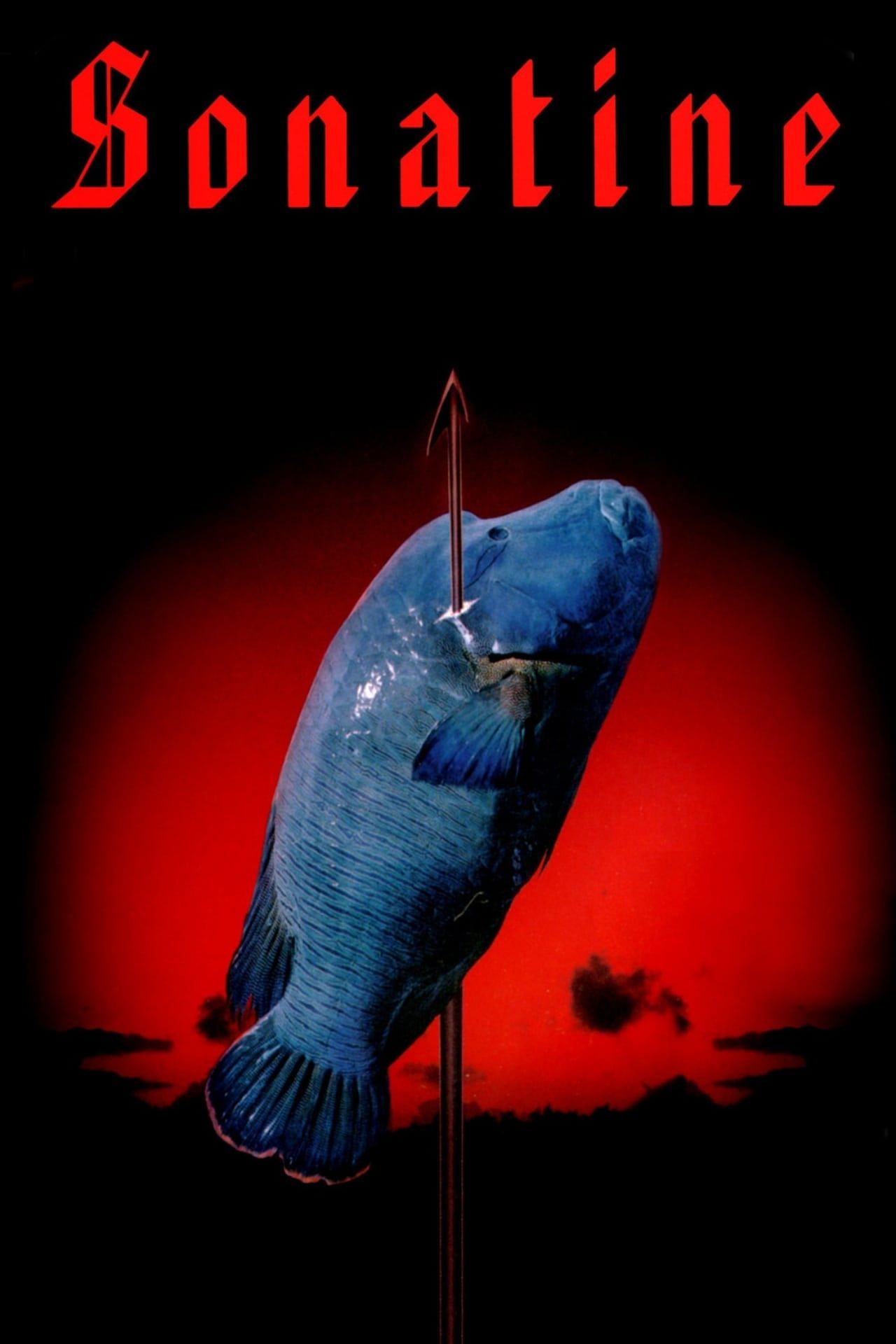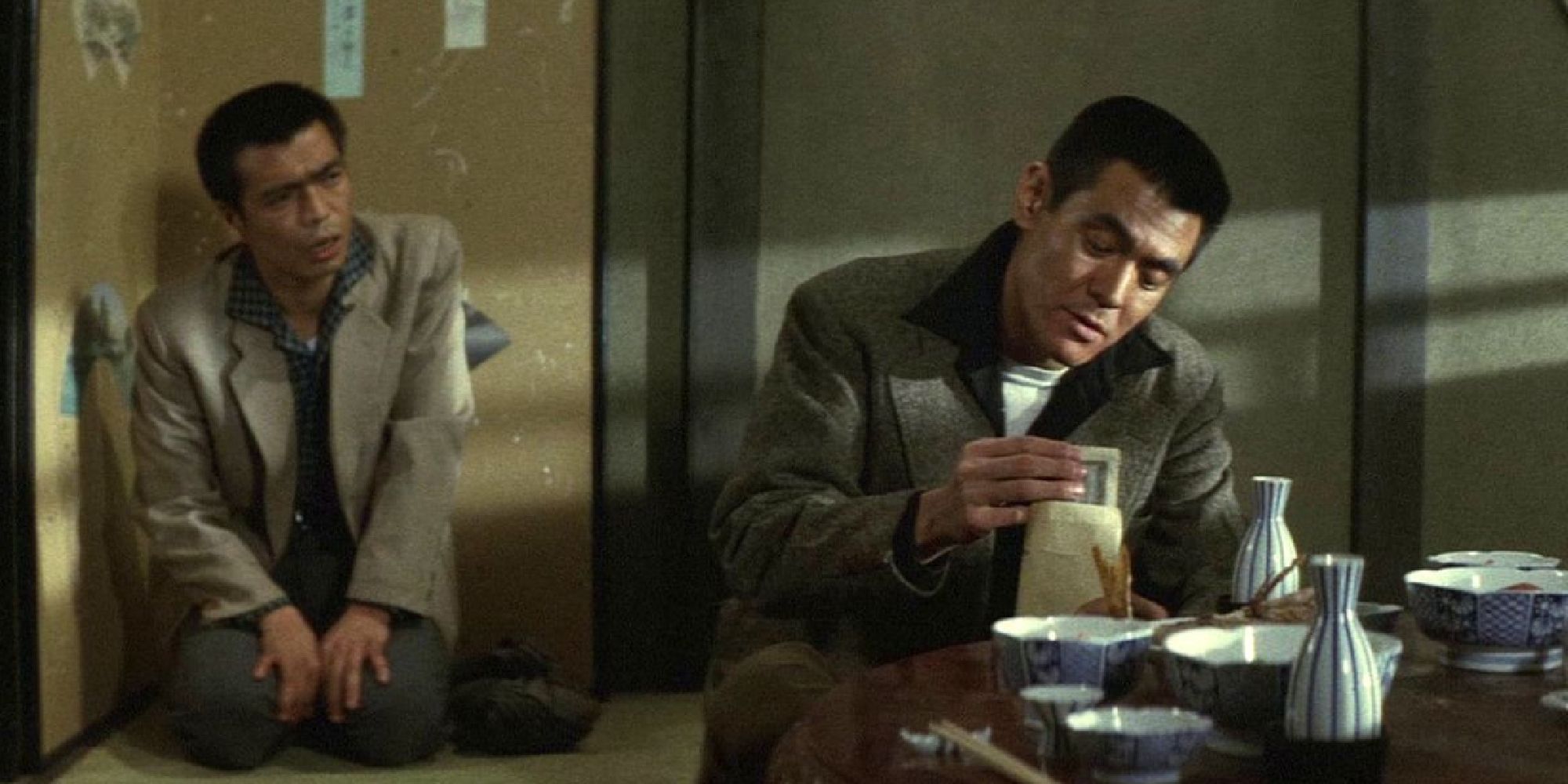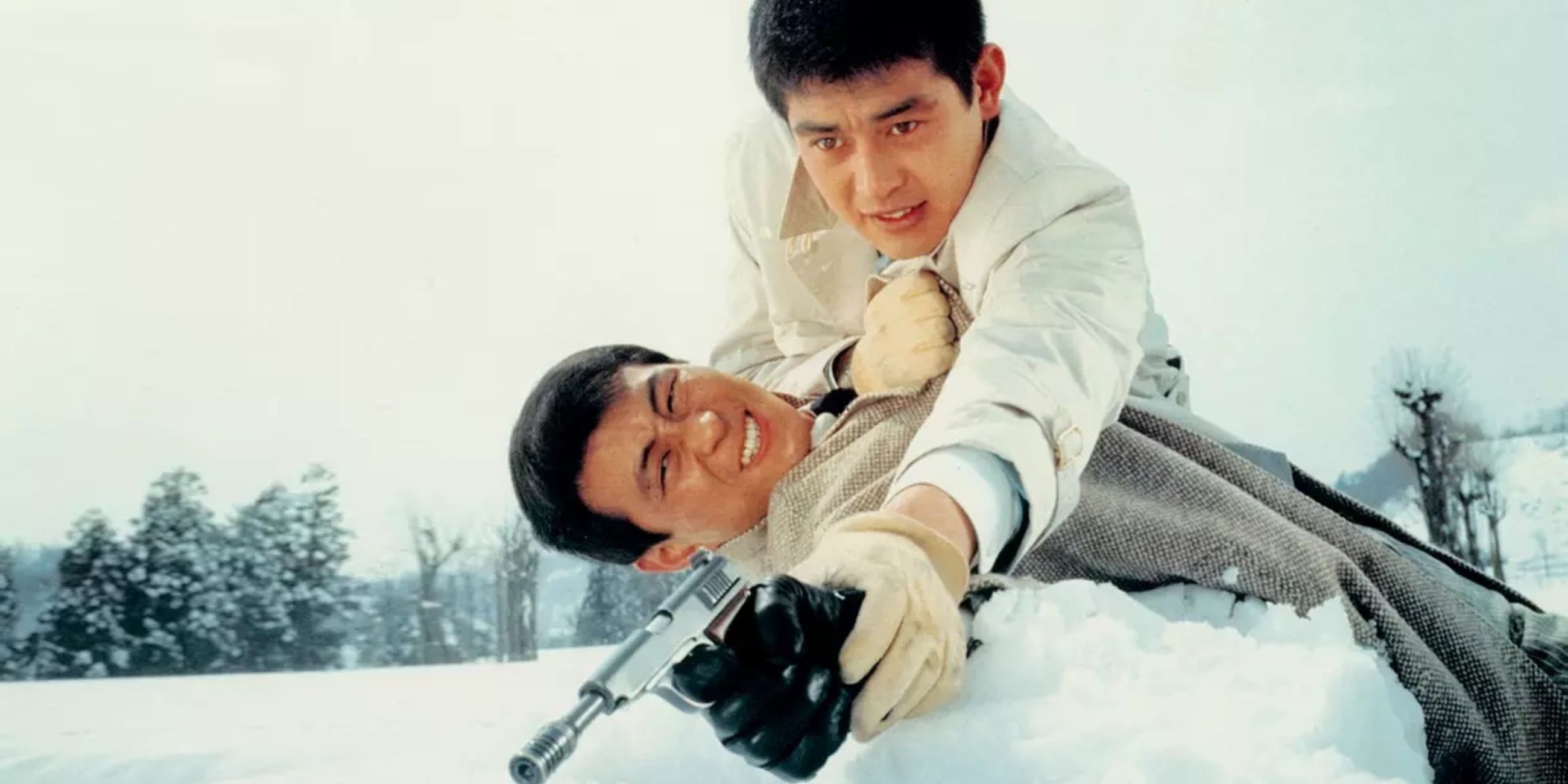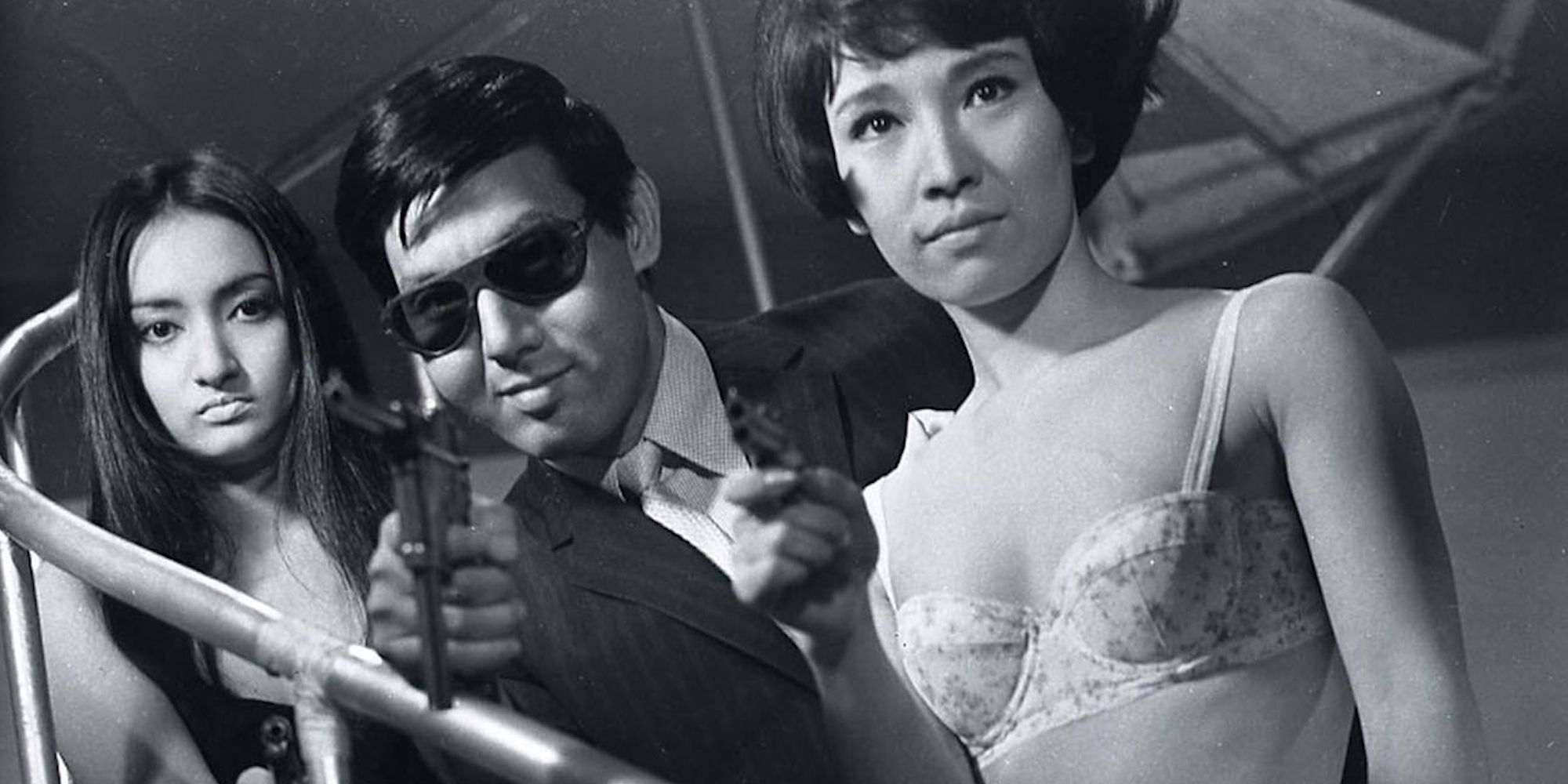Yakuza motion pictures are a Japanese staple, however the subject has additionally been explored by worldwide filmmakers. Nonetheless, nobody can encapsulate the gritty and infrequently brutal world of yakuza cinema in addition to Japanese filmmakers, exactly as a result of they perceive the mentality and the toll of such a life.
The yakuza style is full of loyalty, betrayal, brotherhood, and blood. These movies are sometimes much like Western motion crime movies, which drew inspiration from some legendary yakuza movies. The style is as influential because it shows influences, however it often does not glorify the violence in it, however quite condemns it, a stark distinction from different crime subgenres in cinema. This checklist will cowl ten yakuza motion pictures you will need to watch not less than as soon as, which can present you simply how highly effective, gritty, and bleak a lifetime of crime might be.
10
‘Wet Canine’ (1997)
Directed by Takashi Miike
Takashi Miike is likely one of the important Japanese filmmakers, however his work might be arduous to explain. He usually ventures into surrealism, like in Ichi the Killer or Useless or Alive (one other nice yakuza-themed movie). Wet Canine, nevertheless, is the reverse of most of his work – it is grounded, quiet, and moody, providing a considerably miserable look into the lifetime of a disgraced and exiled yakuza. Stripping the glamor and leaving solely the naked bones of such a life leaves its protagonist lonely, looking for belonging.
Wet Canine is ready in Taipei, Taiwan (the place it was additionally filmed), the place the primary character, Yujiro (Present Aikawa), is in exile and does small work as a hitman so he can accumulate cash to return to Japan. Whereas he slums it, Yujiro’s ex-girlfriend visits his doorstep and leaves a little bit boy she claims to be Yujiro’s son. He now has to rethink most of his strikes and actions to not traumatize the boy, however the lifetime of a yakuza is rarely clear. Miike’s imaginative and prescient involves life via the good performances, particularly the lead, Present Aikawa, who starred in quite a few Miike motion pictures and is one among Japan’s largest motion heroes.
9
‘Graveyard of Honor’ (1975)
Directed by Kinji Fukasaku
Kinji Fukasaku is likely one of the finest motion movie administrators in Japan, and his experience was all the time yakuza movies; the creator of the Battles With out Honor and Humanity sequence had many different motion pictures about Japanese mobsters, and Graveyard of Honor is one among them. This nihilistic, unrelenting movie is definitely a biopic based mostly on the rise and fall of Rikio Ashikawa. The film was based mostly on the e-book by Fujita Goro and describes Ashikawa’s self-destructive and unruly character. Ashikawa is brilliantly performed by Tetsuya Watari, an amazing motion hero of the time.
Graveyard of Honor follows Rikio Ashikawa, a yakuza who rejects each code of honor. He is harmful, each to himself and others, and when he turns into an official gang member, his self-control spirals and causes chaos wherever he seems. It is a typical anti-hero film, although you wish to really feel for him not less than a little bit bit. His character might be arduous to search out likable, however Ashikawa’s spectacular will to comply with a code of self quite than anybody else’s is one thing value praising. This yakuza noir depicts issues mainly falling aside, which is type of its level.
8
‘The Wolves’ (1971)
Directed by Hideo Gosha
The Wolves, aka Shussho Iwai, is probably the most legendary yakuza movies of all time, a must-watch, usually beneficial and lauded by critics for its stunning coloration work and poetic storytelling. Hideo Gosha is a reasonably unknown director, however he put himself on the map with The Wolves. The New York Instances critic Vincent Canby wrote, “Although stuffed with blood and gore, The Wolves can also be resolutely sentimental and picturesque,” ending his assessment with the phrase “Stunning Bloodshed.”
The Wolves is ready within the Nineteen Twenties and follows Seiji Iwahashi (Tatsuya Nakadai), a yakuza who was imprisoned for the homicide of a rival gang’s boss. After a change within the political panorama of Japan, Iwahashi is pardoned and launched early, solely to note the world has quickly modified and is in contrast to something he anticipated to search out upon return. He maintains and insists on loyalty, however quickly realizes he is kind of alone in his efforts. The world seems to be stunning, although bloody, from Gosha’s perspective. The Wolves may need a barely complicated plot, however it’s well worth the watch — nay, it is necessary.
7
‘Outrage’ (2010)
Directed by Takeshi Kitano
One other important yakuza film director, Takeshi Kitano, is an attention-grabbing visionary. Anybody who meets Kitano in a yakuza setting will assume he is solely completed these varieties of motion pictures. Nonetheless, very like Miike typically ventures into comedy or gritty realism, Kitano can also be well-versed in tales about love, romance, and household. We might even discover his yakuza movies having some kind of love and household themes, even when it is a chosen household like a criminal offense gang. Outrage is only one of quite a few Kitano yakuza options, and it depicts lethal violence, ice-cold characters, and a no-nonsense have a look at a fractured crime syndicate.
Outrage follows members of the Sanno-kai crime syndicate when the chief, Sekiuchi (Soichiro Kitamura), orders the elimination of a drug-dealing gang. That process will get handed right down to Otomo (Kitano), who runs a crew and has a selected approach of coping with issues. Kitano himself talked about he needed Outrage to be enjoyable and that he began writing it by first questioning how every character could be killed earlier than writing the story round that. Outrage is the primary of three motion pictures that Kitano names the Outrage Trilogy; you’ll be able to watch all three to finish the impression of his character, Otomo.
6
‘Road Mobster’ (1972)
Directed by Kinji Fukasaku
Fukasaku made many movies with Bunta Sugawara as his chosen motion lead, and Road Mobster is one. This explosive and uncooked movie depicts road violence in its grittiest kind; it is purely based mostly on survival. Realism was Fukasaku’s forte — lots of his most violent movies, primarily yakuza tales, had been filmed in a documentary fashion, making the blood and violence hit more durable. Road Mobster can also be a part of a movie sequence titled Gendai Yakuza; it is the sixth installment, and all-star Sugawara, however they are not associated, and every director is totally different.
Road Mobster follows a low-level punk, Isamu Okita (Sugawara), and his approach via the felony underworld in Kawasaki, Japan. Okita refuses to bend to any guidelines, has rage points, and does not pull any punches; following him feels painful however attention-grabbing in some ways. Road Mobster is fairly relentless in its brutality and violence, usually turning into an excessive amount of for the viewers. Nonetheless, as such, it is a necessary yakuza film, displaying the realities of life at each step.
5
‘Sonatine’ (1993)
Directed by Takeshi Kitano
Sonatine is an atypical yakuza movie as a lot as it is vitally typical; it provides calm with its quieter moments and thrill with its incessant violence. Kitano’s imaginative and prescient was absolutely shaped with Sonatine, the place he discovered an amazing center floor between chaos and calm in a yakuza’s each day life. Sonatine will get existential fairly often, displaying that such motion pictures aren’t all the time meant to make your blood pump, but additionally to appreciate that even a yakuza can get the blues. Don’t fret, although — there are many artistic and downright pointless kills within the movie; in any other case, it would not be a yakuza film.
Sonatine follows the crime gang enforcer, Murakawa (Kitano), beginning to really feel some existential dread and burnout from the lifetime of crime. When he is ordered to journey to Okinawa, an island within the south of Japan, to barter peace between two warring clans, he realizes issues aren’t as he anticipated. Okinawa can also be very calm and considerably torpid in its laid-back nature, which is international to a thoughts like Murakawa’s. Many would name this movie minimalist, however that makes it all of the extra tragic and highly effective.
4
‘Youth of the Beast’ (1963)
Directed by Seijun Suzuki
Joe Shishido is one among Japan’s largest motion stars, all the time enjoying the cool and badass killer. After making 100 movies with Nikkatsu, together with the Western Fast Draw Joe, his popularity as Joe the Ace was cemented in historical past. Youth of the Beast stars Joe the Ace in one among his most well-known and distinguished roles; it is a visually beautiful, genre-defining traditional that is a must-watch for any followers of motion crime and yakuza themes. Youth of the Beast is fashionable and effortlessly cool, harking back to the earliest James Bond installments with femme fatales, bitter rivalries, and one man saving the day.
Youth of the Beast follows former cop Mizuno (Shishido), who finds out upon his launch from jail that his former associate dedicated suicide. Believing it to be a setup, Mizuno infiltrates a yakuza gang that he suspects is tied to his associate’s demise. The film ensues with a lot of twists, turns, and double-crosses, leaving the yakuza to destroy themselves whereas Mizuno struts off into the sundown, cool and all. Youth of the Beast is Seijun Suzuki’s defining movie, flipping a yakuza story into the story of a hero who goes in opposition to them.
3
‘Battles With out Honor and Humanity’ (1973)
Directed by Kinji Fukasaku
What would the checklist of must-see yakuza motion pictures be with out its most distinguished consultant, Battles With out Honor and Humanity? This film was the primary in a sequence of 5, after which Fukasaku revived the franchise with New Battles. The 5 preliminary movies had been launched in 1973 and 1974, making it a extremely productive 12 months for Fukasaku. Battles With out Honor is the definitive postwar yakuza movie, made in Fukasaku’s signature documentary fashion and full of intense and infrequently sudden violence. There actually is not any honor in these yakuza tales.
Battles With out Honor and Humanity depicts post-war Hiroshima and all of the members in its underworld. The story notably follows Shozo Hirono (Sugawara), who rises within the ranks of Hiroshima’s underground; nevertheless, it additionally focuses on his gang’s rivals, fragmentation inside his gang, and the lack of innocence in younger males who do not produce other issues in life. The film was based mostly on the memoirs of a real-life Hiroshima yakuza, Kozo Mino, and it intricately exhibits how briskly the relationships between yakuza can change and grow to be unstable.
2
‘Tokyo Drifter’ (1966)
Directed by Seijun Suzuki
Suzuki’s most well-known film outdoors of Japan is Tokyo Drifter. This closely stylized movie exhibits that fashion and substance have a seat on the desk, being “sufficiently big for each of them.” Tetsuya Watari gained widespread fame along with his lead function as Phoenix Tetsu, a hitman on the run from two yakuza gangs. Regardless of the neon-drenched aptitude, Tokyo Drifter is a heavy-hitting yakuza movie, stuffed with tales of yakuza code and outbursts of violence.
Tokyo Drifter follows Phoenix Tetsu, an expert hitman for a yakuza gang and the right-hand man to Kurata (Ryuji Kita), the clan chief. When Kurata decides to go professional and disband his clan, Phoenix Tetsu is approached by Kurata’s rival, Otsuka. As Tetsu rejects him, he units off a wild chase by which he’s the largest goal. It is typically beneficial to look into Suzuki, as he is probably the most artistic administrators hailing from Japan, visually and storytelling-wise, with motion pictures usually amongst the very best Japanese movies of all time.
1
‘Branded to Kill’ (1967)
Directed by Seijun Suzuki
Sure, one other Suzuki movie, however that is the cult yakuza film. Heavy on the absurd and the summary, but additionally brutal and relentless, Branded to Kill is Suzuki’s most radical enterprise into the style; some may even name it a deconstructed yakuza movie. Branded to Kill is kind of wild, which is simply one more reason for its iconic standing. Wild within the sense that Joe Shishido kills a person via a sink pipe whereas he is leaning over it, or the truth that his character has a boiled rice fetish. There are many insane shootout moments, however Branded to Kill is so value it.
The film follows a yakuza hitman, Hanada (Shishido), aka Quantity Three Killer, who will get employed by a mysterious and exquisite Misako (Annu Mari) to kill a foreigner. Nonetheless, Hanada botches the project and is now on the run from the yakuza enforcers in his syndicate. Funnily, Nikkatsu hated the film, so that they fired and banned Suzuki from making motion pictures for his or her studio. Nonetheless, Suzuki sued them and received, garnering the help of fellow filmmakers; right now, Branded to Kill is cited as an inspiration to administrators like Park Chan-wook, Jim Jarmusch, and Nicholas Winding Refn.

